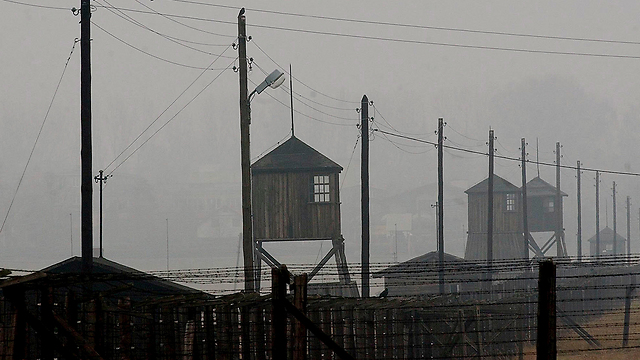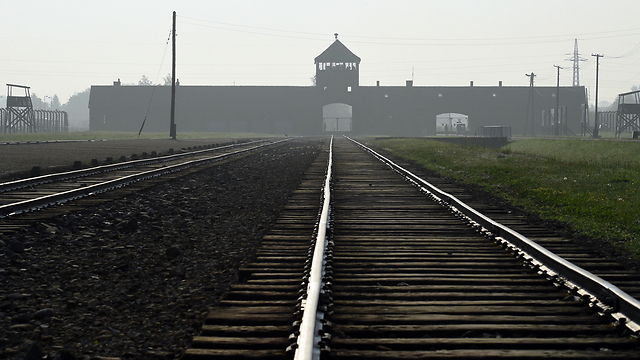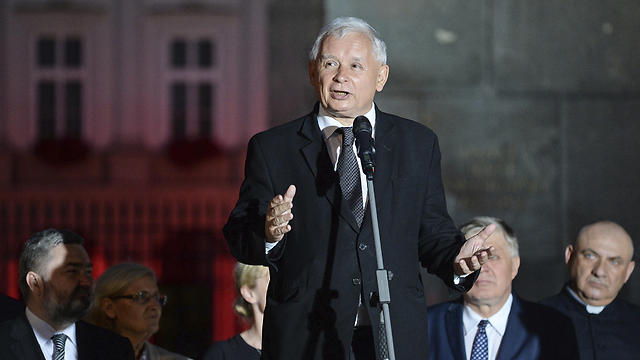
Israel rebukes Poland over death camp dissociation bill
Israel denounces Poland's newly passed legislation barring the association of Poland with the Nazi death camps in a proclaimed move to 'defend the truth against slander,' calling it 'an attempt to rewrite history and eschew responsibility.'
Israel's government spoke out Saturday against a bill that was approved by the Polish parliament the day before which seeks to distance Poland from the construction and operations of the Nazi regime's concentration camps.
The bill, approved on the eve of the International Holocaust Remembrance Day, prescribes prison time for defaming the Polish nation by using phrases such as "Polish death camps" to refer to the killing sites Nazi Germany operated in occupied Poland during World War II.
Israel vehemently disapproved of the bill, asking the Polish government to amend the proposal before continuing to advance the legislation.
"No law can change a historical truth," the Foreign Ministry said in a statement.
Several minutes later, Prime Minister Benjamin Netanyahu stated his strong opposition to the bill, which he called "baseless."
"History cannot be changed, and the Holocaust must not be denied," Netanyahu tweeted, adding that he "instructed the Israeli Ambassador to Poland to meet with the Polish Prime Minister" Saturday evening to express his "strong position against the law."
President Reuven Rivlin responded to the passing of the bill by quoting former Polish President Aleksander Kwasniewski's May 2000 address to the Knesset.
"One must not falsify history! One must not conceal the truth! Every crime and every roguery should be named and castigated, and circumstances examined and revealed," Rivlin quoted.
Several lawmakers from both sides of the aisle also made sure to express their strong indignation, calling on the Polish government to either revise the proposed legislation or nix it altogether.
Justice Minister Ayelet Shaked echoed the assertions of the president and prime minister, calling the bill "an attempt to rewrite history and remove responsibility from the Polish nation," noting that "many Poles, like other nations (Hungarians, Ukrainians, and others), helped Nazi Germany murder Jews," and speaking against their move to eschew responsibility.
Opposition leader MK Isaac Herzog demanded Netanyahu to "call the Israeli ambassador in Warsaw for consultations on a bill that is fundamentally unacceptable."
Meanwhile, Yesh Atid Chairman Yair Lapid got into a twitter feud with the embassy of the Republic of Poland in Tel Aviv after he posted his strong condemnation of the bill, which he claimed "tries to deny Polish complicity in the Holocaust."
"It was conceived in Germany but hundreds of thousands of Jews were murdered without ever meeting a German soldier. There were Polish death camps and no law can ever change that," Lapid wrote, to which the embassy replied that the intention of the bill "is not to ‘whitewash’ the past, but to protect the truth against such slander."
"Your unsupportable claims show how badly Holocaust education is needed, even here in Israel," the embassy slammed Lapid.
Refusing to let the lashing go unanswered, Lapid noted that he is the son of a Holocaust survivor and that he lost family in Poland to both Germans and Poles, adding he "doesn't need to be educated about the Holocaust" by the Polish embassy and demanding they apologize immediately.
In response, they embassy noted that the death camps aforementioned were Nazi and staffed with German troops, calling Lapid's remarks "shameless."
Foreign Ministry Spokesman Emmanuel Nahshon commented on the argument, calling the Polish embassy's decision to "preach morality to us about Holocaust remembrance" both "amazing and saddening."
Yad Vashem stated that, although "there is no doubt that the term "Polish death camps" is a historical misrepresentation," as the camps were built and staffed by Nazi occupiers, passing the bill as it stands "is liable to blur the historical truths regarding the assistance the Germans received from the Polish population during the Holocaust" and could be used to restrict " statements by scholars and others regarding the Polish people's direct or indirect complicity with the crimes committed on their land during the Holocaust."
Dorota Glowacka, a legal adviser with the Helsinki Foundation for Human Rights in Warsaw, said the broad scope of the bill opens up the potential for abuse.
Anti-slander efforts and national pride
Many major news organizations are sensitive to the issue and ban the language, but it nonetheless crops up in foreign media and statements by public officials. Former US President Barack Obama used it in 2012, prompting outrage in Poland.
Many Poles fear such phrasing makes some people, especially younger generations, incorrectly conclude that Poles had a role in running the camps.
The legislation calls for prison sentences of up to three years. It still needs approval from Poland's Senate and president.
Critics say enforcing such a law would be impossible outside Poland and that within the country it would have a chilling effect on debating history, harming freedom of expression.
While the law contains a provision excluding scholarly or academic works, opponents still see a danger.
They especially worry it could be used to stifle research and debate on topics that are anathema to Poland's nationalistic authorities, particularly the painful issue of Poles who blackmailed Jews or denounced them to the Nazis during the war.
Poland's ruling party, the Law and Justice Party, has been trying to raise awareness of the hardships suffered by Poles under Nazi rule, including the death penalty imposed on Poles who aided the Jews. This legislation is their most recent step in bringing the better part of their past to the limelight.
Itamar Eichner and Moran Azulay contributed to this article.













